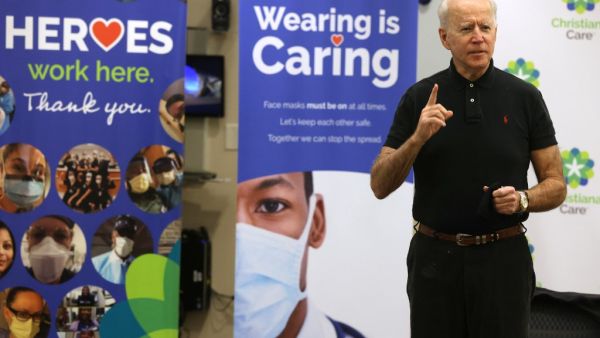US President-elect Joe Biden on Monday got his second dose of the COVID-19 vaccine manufactured by American pharmaceutical firm Pfizer and its German partner BioNTech.
In a live event, Biden received the second vaccination in his home state of Delaware, where his campaign transition headquarters is located.
Folks, I just received the second dose of my COVID-19 vaccine — and just like the first dose, it was safe, quick, and painless.
— Joe Biden (@JoeBiden) January 11, 2021
I urge everyone to get vaccinated once it’s your turn. Because only together can we save lives and beat this virus. pic.twitter.com/w1m8gEh2iL
"I’m doing this to demonstrate that people should be prepared when it’s available to take the vaccine. There’s nothing to worry about. I’m looking forward to the second shot and so is [my wife] Jill. She’s had her shot earlier today," he said before taking the vaccine.
Biden’s second vaccination comes three weeks after he received the first dose on Dec. 21.
Although the US has distributed 8 million doses since Dec. 14, with 4 million coming in the last week, this total falls far short of the goal set by the outgoing Trump administration, which had aimed to distribute 20 million doses by the end of 2020.
One of the Biden administration goals is to distribute 100 million doses during his first 100 days in office.
While nearly 8.99 million people in the US have received the first dose, there were some 25.5 million doses distributed as of Monday 9.00 a.m. Washington, D.C. time (1400 GMT), Centers for Disease Control and Prevention (CDC) data showed.
Joe Biden receives the second dose of a Covid-19 vaccine on camera as part of an effort by the President-elect's incoming administration to reassure the country of the safety of the vaccines. https://t.co/ENQN0DtcXi pic.twitter.com/f8JAzkmV1y
— CNN (@CNN) January 11, 2021
A survey in the US, however, showed that only half of the population wants to receive the vaccine, while a quarter of adults were not sure whether they want to get vaccinated.
The US still leads the world with over 22.4 million cases and more than 374,000 deaths, according to the latest figures from Johns Hopkins University.
This article has been adapted from its original source.










